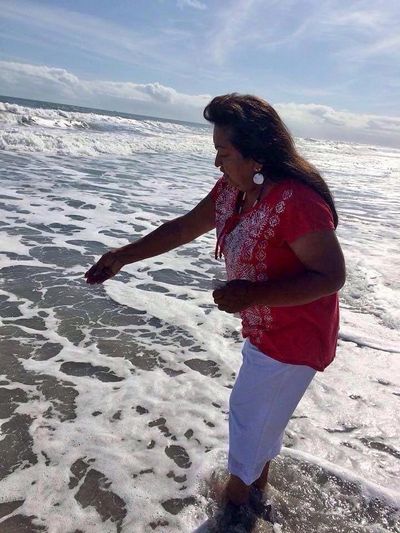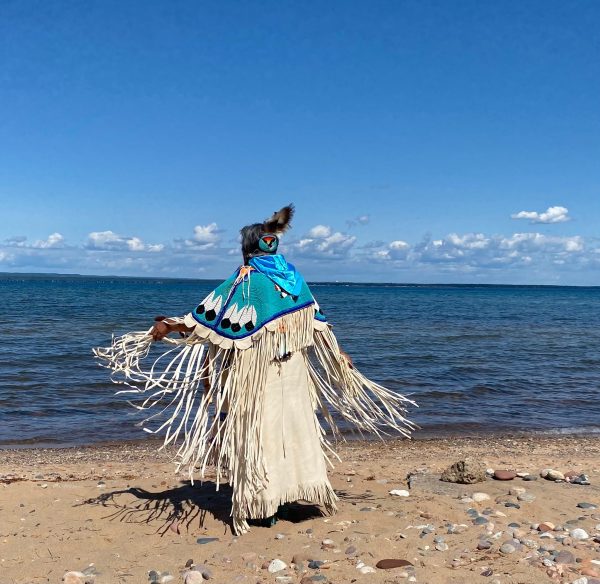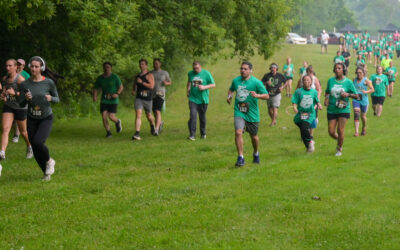October 10 marks the annual World Mental Health Day. As many of us have seen throughout the past 18 months of COVID-19 calamity, a healthy mind is key to navigating challenges and unforeseen circumstances.
NHBP’s Behavioral Health Services saw its fair share of challenges in addressing behavioral health needs for NHBP Tribal Members when pivoting to telehealth services to accommodate patients, which has crossed physical and financial barriers for some.
“We’ve seen a huge increase in our patient load this year. To put that in perspective: throughout all of 2020, our behavioral health team did 1,785 office-based outpatient visits. That same year, we had 12 substance-use disorders in-patient referrals so we sent 12 individuals to an in-patient center to address their substance use,” said NHBP Behavioral Health Manager Nichol Bremer. “In the first half of 2021, we have done 1,865 outpatient visits. We have had 36 substance-use patient referrals. We have also seen four mental health-only inpatient referrals, which we’ve never seen before.”
Over the past few years, NHBP’s Behavioral Health has steadily increased access to services for Tribal Members, continuing to build the strong foundation of trust that is pivotal in any behavioral health space.
That trust has inspired a healing trend among NHBP. In addressing substance-use disorders, NHBP Behavioral Health is able to refer patients to in-patient facilities and programs. Over her years in the Department, Bremer said that she has watched recovery start with one family member who then referred another family member to reach out and so on, creating a domino effect of accessing resources and finding recovery.
Another aspect to increased trust is access to telehealth in general. The Department recently surveyed telehealth recipients to see if it was beneficial to them and whether it was only worth it because we were all in COVID-19 lockdown.
“It showed us that telehealth helps people overcome things other than the pandemic such as transportation, childcare, domestic violence at times, economic constraints. We found that people really like that option,” she said.
In response to that survey coupled with the changing landscape due to the COVID-19 pandemic, telehealth is likely here to stay in some capacity – even post-pandemic.
— Bringing Balance —
While NHBP Behavioral Health offers more Western-based counseling methods, Traditional methods of healing are also at the heart of what they do.
“We work very hard to bring culture into everything that we do. It’s challenging because we have clients that come from all walks of life and we have to meet that client where they’re at. If a Traditional Elder comes into our office, we will offer whatever service they might want. They might want to Smudge. They might want to connect with a healer. They might want to talk about a sweat,” Bremer said. “The very next hour, we could have someone walk in that is not Traditional and wants to take a totally different route. We want to meet those clients wherever they are when they walk in.”
To meet Traditional clients where they are, Behavioral Health offers (when COVID-19 safe) culturally-focused recovery groups and employs a Native provider. Last month, the Department was able to offer again Traditional healing services provided by Beatrice Jackson.
“There is a balance: mental, physical, emotional and spiritual. There is a balance between all of those. A person who is not healthy physically is going to have different needs than someone who is in recovery from alcohol or different drug addictions,” Jackson said. “There will be different things and methods of awakening the inner. Sometimes it’s just purifying your body to get rid of toxins, or in spirituality, when somebody does your Tobacco for the first time, it could be making a very humble little Tobacco bag with needle and thread; just making it and, emotionally, knowing that you are not alone. There are other people who are just like you.”
She, like Bremer, offers guidance in the healing journey and referrals when specialists are necessary. She also offers cultural teachings, both in groups and through individual sessions hosted through NHBP Behavioral Health. This month, Jackson will be joined by Steve Pego as well.

When someone reaches out to her, no matter how much or how little knowledge they hold or healing they’ve already done, she said that the fact that they know they belong to NHBP is a big thing.
“As a Tribal Member, the first thing they know is that they are part of the Nottawaseppi Tribal Community and to recognize that, no matter how much you know right now, you have the bigger picture of belonging — belonging to a Tribe that recognized you. A lot of people are not that lucky to have that recognition,” Jackson said.
So when someone says they are an NHBP Tribal Member, Jackson continued, “they’re saying a very big thing and they have to recognize that for them to be alive and surviving right now, their Ancestors did a lot of work for that to be made a reality. And the only thing they really have to do at that point is to take your Tobacco and give thanks for where they are.”
Offering both Western and Traditional healing services through Behavioral Health increases a person’s chance at recovery and overall mental wellness, Bremer said.
“When you think about depression, research shows that an anti-depressant will help to improve your depression by 30-40%. That’s a decent chance of improvement. Research shows that counseling will also decrease your depression symptoms by about 30-40%. If you combine them both, you’re looking at a 60-80% chance of recovery,” she said. “That’s how I look at Traditional Medicine and the more western medicine; if you’re able to embrace all resources at your disposal, you’re more likely to find recovery.”
The first step to mental wellness is usually the hardest for many, either due to physical barriers such as COVID-19 or lack of transportation, or emotional barriers like anxiety and depression.
“I love people and I love my work. Don’t be afraid. Take that first step,” Jackson said of the healing journey. “Then there’s another one after that. And then it gets better and better all the time.”





0 Comments